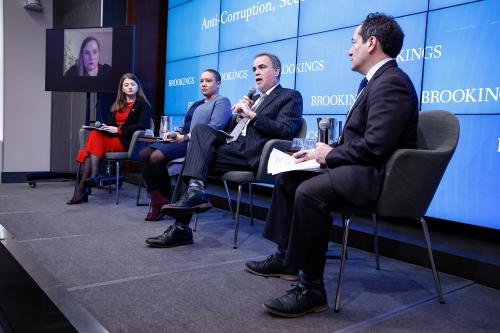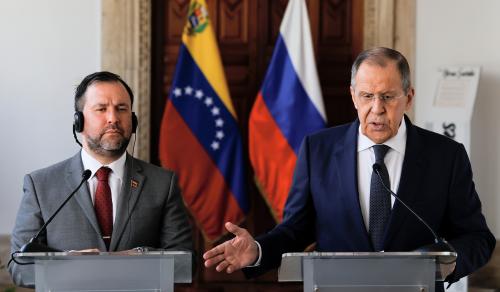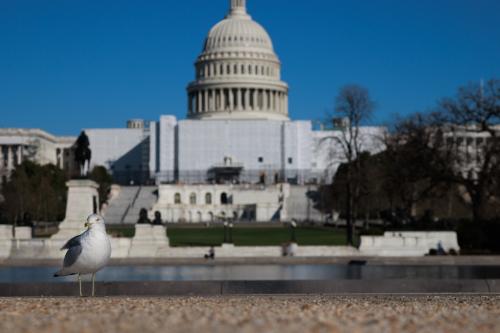On the eve of today’s resumption of nuclear negotiations between Iran, the United States and five other world powers, an American journalist went on trial this week in Tehran, on preposterous charges of espionage. The confluence should serve as a cautionary tale about the prospects for Iran’s political moderation, and it underscores the limitations to American influence as well as the persistent threats to basic freedoms within Iran’s Islamic Republic.
The defendant at the center of this week’s trial, Washington Post correspondent Jason Rezaian, is only the latest in a series of Americans with dual Iranian citizenship to be trapped, without provocation or justification, within Iran’s repressive judicial system.
You’ve surely heard some of their names before, including Haleh Esfandiari, the scholar who was detained for months during a visit to her 93 year old mother in 2007; Roxana Saberi, the journalist and former Miss North Dakota who was jailed for four months in 2009; Maziar Bahari, the Newsweek correspondent and documentary filmmaker whose memoir about his 2009 imprisonment was adapted for the big screen by Jon Stewart.
There are many more dual-nationals who have been targeted by the regime, including several who remain behind bars today: Saeed Abedini, a Christian pastor, and Amir Hekmati, a former U.S. Marine – who were arrested in 2012 and 2011 respectively and have been jailed in Iran ever since.
Rezaian’s sudden arrest last summer prompted a search for explanations. After all, incarcerating one of the only working American journalists in the country was hardly likely to boost Iran’s position in the sensitive and hard-fought nuclear negotiations. For the most part, the conventional wisdom has depicted Rezaian’s detention as the latest salvo in Iran’s fierce factionalized struggle: an attempt to undermine the nuclear negotiations; to weaken or discredit Iran’s moderate president, Hassan Rouhani; to disrupt any normalization between Iran and the West — or all of the above and then some.
Perhaps. All these theories are perfectly reasonable. However, any attempt at surmising intent from the actions of a repressive government tends to over-intellectualize. We want to find some logic that explains actions that seem fundamentally irrational, and all that much the better if the explanation exonerates our negotiating partners and facilitates our preferred outcome within Iran’s contested politics.
Unfortunately, all the theories of the case are ultimately irrelevant. The simple reality is that the Iranian government arrested Jason Rezaian because they can, and they have held him for the same reason. Iran’s ruling system remains a profoundly authoritarian one, anchored in place by an arbitrary judicial system that is fiercely antagonistic to individual freedoms as well as to the United States. Rezaian’s arrest is perfectly consistent with the Islamic Republic’s ideology and policies as practiced since 1979.
As I wrote last July shortly after Rezaian’s initial arrest:
Despite the sophistication of its society, the vibrancy of its debates, the trappings of competitive and representative politics, at the heart of the Islamic Republic is a police state. If its agents want to grab you, they can and they will and they need no excuse. Multiple intelligence and security organizations control a prison system whose reaches are not known to even its parliament and whose abuses are infamous. No one, not the most innocuous Western tourist or the most well-connected Iranian power-broker, is immune to its reach.
That this police state can coexist with institutions that lend the system some measure of popular legitimacy is the Islamic Republic’s secret strength and an explanation for its endurance; that these instruments of surveillance and repression have withstood episodic confrontations by an educated and engaged citizenry remains the real tragedy of the revolution.
That tragedy echoes in Jason Rezaian’s trial, which is — not surprisingly — closed to the press. His fate will not impede a nuclear deal, but Tehran’s systematic reliance on coercion should not be forgotten in these final talks, or in the deal’s aftermath. Because what has happened to Rezaian happens to Iranians every day — journalists and activists, ordinary people as well as some of Iran’s most prominent politicians (including a former prime minister and former speaker of the parliament, who have spent more than four years under a draconian house arrest after contesting the dubious results of the 2009 presidential election.)
And while Iran is perpetually in the throes of change, there is little likelihood that the system will reform itself quickly in the wake of a nuclear deal. For all their charm and at least some good intentions, Iran’s moderates represent the Islamic Republic’s ultimate survivors, who managed to navigate the treacherous politics of the past decade without experiencing the inside of its prisons.
They speak the language of reform and respect for human rights, and they may even believe it. But in practice, they expend practically no political capital to effect change. And they even have the audacity to try to sweep the reality under the rug, as both Rouhani and his well-liked foreign minister Mohammad Javad Zarif each did in 2014 and 2015 visits to New York, when each asserted unabashedly that Tehran does not imprison people for their writing or for their beliefs.
Despite his long detention, Jason Rezaian is fortunate in two respects: he is an American and he is affiliated with Washington’s premier news organization. For those reasons, his arrest received immediate, high-level attention and his plight has remained on front pages and in President Obama’s talking points. If only the same were true for his other compatriots in Evin — Amir Hekmati and Saeed Abedini — as well as for all the courageous Iranians who have run afoul of the system and who don’t have the benefit of an American passport to focus international attention on their predicament.



Commentary
Spies, lies, and Iran: An American reporter goes on trial for espionage in Tehran
May 27, 2015